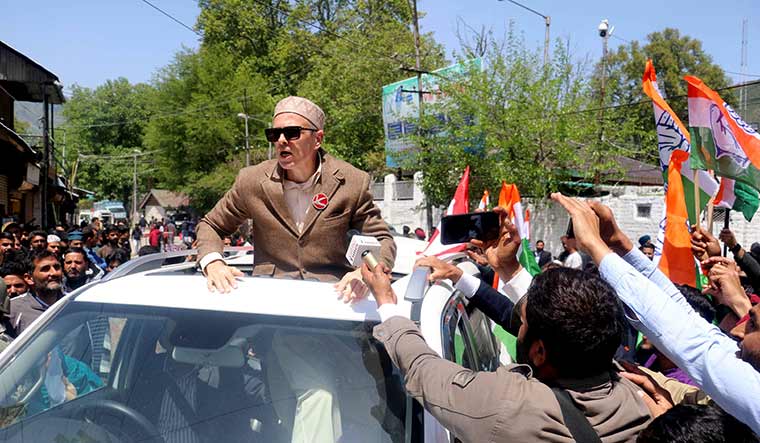Regional parties of Jammu and Kashmir which are a part of the INDIA bloc consider the Lok Sabha elections a referendum on the revocation of Article 370 and the subsequent division of the state into two Union territories. The main adversary for the National Conference (NC) and the Peoples Democratic Party (PDP) is the BJP, but they are also fighting against each other. They are also engaged in a bitter battle with the Apni Party founded by former PDP leader Altaf Bukhari, and Sajad Lone's People’s Conference. They call Bukhari and Lone BJP proxies.
The BJP's campaign is centred on the abrogation of Article 370, the restoration of peace and the suppression of separatism. The party also targets 'dynastic' politics in Jammu and Kashmir. The contrasting narratives regarding the scrapping of Article 370 have come to define the campaigns of the key players.
Mehbooba Mufti, former chief minister and president of the PDP, has placed the ‘rights and identity’ of the people of Kashmir at the forefront of her campaign. At a roadshow in Rajouri, she accused the BJP of hurting the locals by allocating natural resources to outsiders. “Neither the Dogras of Jammu nor the Buddhists of Ladakh are content, let alone the people of Kashmir, who live in fear,” she said. “There has been no development during the BJP rule.”
The BJP has chosen to contest only two of the five Lok Sabha seats, Udhampur and Jammu, situated in the Hindu-majority Jammu region. There are no BJP candidates from the three seats in Kashmir—Srinagar, Baramulla and Anantnag-Rajouri. The Anantnag-Rajouri constituency was formed by the Delimitation Commission by merging the districts of south Kashmir—Anantnag, Kulgam and Pulwama—with the Muslim-majority districts of Rajouri and Poonch in Jammu. The Pir Panjal mountains divide the constituency, making campaigning difficult, although a connection is available through the fair weather Mughal Road, which had served as a route for the Mughal emperors to reach Kashmir from Delhi.
The BJP's plan to extend its sway to Kashmir via the Mughal Road has not succeeded because of the resentment among the Gujjars and the Bakerwals over the granting of Schedule Tribe status to communities such as Paharis and Gadda Brahmins. “We wanted to fight the elections from all the three Lok Sabha seats in Kashmir on our strength,’’ said BJP state president Ravinder Raina. “Sometimes difficult decisions are made to achieve a big goal. We are supporting parties which are patriotic and are working for the betterment of Kashmir.”
Omar Abdullah, former chief minister and vice president of the NC, challenged the BJP to put up candidates from Kashmir. He said they would lose their deposits. “The party in power at the Centre snatched away our identity and land rights,’’ he said at a rally in Batwara, Srinagar, while campaigning for Agha Syed Ruhullah Mehdi, the NC candidate for Srinagar. “Instead of establishing colleges, universities and schools, they opened liquor shops. They are pushing our youth into drug addiction.” Omar questioned the lack of progress on projects like the Batwara–Lasjan bridge, which was approved by the NC government a decade ago. On April 16, six people lost their lives after a passenger boat capsized in the Jhelum. “Where is the development they speak of? We have not seen any bridges, health centres or schools being constructed,” said Omar.
Another trouble for the BJP is that it does not have a strong local leader. Prime Minister Narendra Modi remains the face of the party. Modi has visited Jammu and Kashmir thrice this year. “The time is not far when assembly elections will be held in Jammu and Kashmir. You will be able to share your dreams with your MLAs and ministers, and Jammu and Kashmir will regain its status as a state,” he said at an election rally in Udhampur on April 12, where the BJP candidate Jitendra Singh is vying for a third term.
Jitendra Singh is locked in a fight with Chaudhary Lal Singh of the Congress, who rejoined the party in March. Observers believe that effective campaigning by the NC and the Congress has swayed Muslims in Udhampur, who constitute 32 per cent of the population. In Jammu, however, the BJP’s Jugal Kishore has the edge over Raman Bhalla of the Congress. Udhampur voted on April 19 and Jammu on April 26.
Mehdi, the NC candidate from Srinagar, has the advantage over the PDP's Waheed Rehman Para because his party has a better organisational structure and its support is spread across the three districts—Ganderbal, Srinagar and Budgam—that make up the constituency. Omar Abdullah is the NC candidate from Baramulla, where he faces Lone, who is also supported by the Apni Party. The PDP has fielded a former Rajya Sabha member, Fayaz Mir.
In the Anantnag-Rajouri constituency, the main contenders are Mehbooba and Mian Altaf of the NC. Former Congress leader Ghulam Nabi Azad, who heads the Democratic Progressive Azad Party, initially announced his candidacy from Anantnag-Rajouri, but withdrew quietly, later. Observers say Azad realised that his chances were slim and that a defeat would further damage his image.
Polling has been rescheduled in Anantnag-Rajouri from May 7 to May 25. Sanjeev Kumar Prasad, a secretary at the Election Commission, said many political parties had asked for a change in date citing logistical challenges which were hurting their campaign. The new schedule could bring down the participation of the Gujjars and the Bakerwals as most of them would move with their herds for grazing by then. That would hurt the prospect of regional parties, especially the NC.


